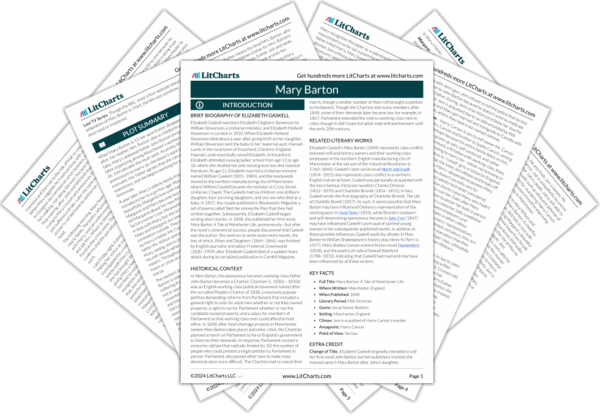In Mary Barton, Christian religious virtues such as faith, hope, and love are presented as necessary to a good life and death. Without these virtues, characters go astray, sin, and suffer. For example, Manchester factory worker John Barton loses his religious faith due to the disjunction between the teachings he reads in the Bible and the way the so-called “Christians” around him behave, since these people seem to tolerate glaring forms of inequality. When John’s baby son, Tom, dies of illness and starvation during an economic downturn, John becomes hopeless and embittered. He can no longer feel Christian love toward members of the rich employer class, whom he feels could help poor workers but don’t. During a subsequent workers’ strike, John becomes so loveless and enraged at the employer class’s behavior that he murders Harry Carson, the only son of the major manufacturer Mr. Carson. In turn, he ends up inflicting upon Mr. Carson the same horrific grief he himself suffered when Tom died. It is only when John realizes that he has committed an evil sin, confesses to the crime, recognizes that Mr. Carson loved Harry as he loved Tom, and begs Mr. Carson’s forgiveness that his blighted life is even partially redeemed. Thus, Mary Barton suggests that adhering to Christian-inflected virtues is a path to peace and happiness, whereas deviating from these virtues leads to misery.
Christianity ThemeTracker

Christianity Quotes in Mary Barton
“Every sorrow in her mind is sent for good.”
“Don ye think He’s the masters’ Father, too? I’d be loth to have ‘em for brothers.”
“Eh, John! donna talk so; sure there’s many and many a master as good or better nor us.”
“If you think so, tell me this. How comes it they’re rich, and we’re poor? I’d like to know that. Han they done as they’d be done by for us?”
To whom shall the outcast prostitute tell her tale? Who will give her help in the day of need? Hers is a leper sin, and all stand aloof dreading to be counted unclean.
A number of pieces of paper (from the identical letter on which the caricature had been drawn that very morning) were torn up, and one was marked.
To avenge his child’s death, the old man lived on; with the single purpose in his heart of vengeance on the murderer. True, his vengeance was sanctioned by law, but was it the less revenge?
Are ye worshippers of Christ? or of Alecto?
“I almost misdoubt thee, thou’rt so pretty. Well-a-well! It’s the bad ones as have the broken hearts, sure enough; good folk never get utterly cast down, they’ve always getten hope in the Lord; it’s the sinful as bear the bitter, bitter grief in their crushed hearts, poor souls; it’s them we ought, most of all, to pity and help.”
I don’t know that he exactly used the term vengeance in his thoughts; he spoke of justice, and probably thought of his desired end as such[.]
The eyes of John Barton grew dim with tears. Rich and poor, masters and men, were then brothers in the deep suffering of the heart; for was not this the very anguish he had felt for little Tom, in years so long gone by that they seemed like another life!
“Let my trespasses be unforgiven, so that I may have vengeance for my son’s murder.”
“You say our talk has done no good. I say it has. I see the view you take of things from the place where you stand.”











